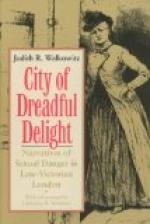“A sign that God reentereth His house,” the merchant explained.
“A sign, O my husband, that the security of the Holy House is dissolved of its own accord for the advantage of its enemies!”
Costobarus observed two huge Ethiopians who appeared bewildered at the threshold of the unfamiliar interior, looking for the master of the house to tell them what to do. The merchant motioned toward a tall ebony case that stood against one of the walls and showed them that they were to carry it out. Hannah continued:
“And thou hast not forgotten that night when the priests at the Pentecost, entering the inner court, were thrown down by the trembling of the Temple and that a vast multitude, which they could not see, cried: ‘Let us go hence!’ And that dreadful sunset which we watched and which all Israel saw when armies were seen fighting in the skies and cities with toppling towers and rocking walls fell into red clouds and vanished!”
“What of thyself, Hannah?” he broke in. “Art thou ready to depart for Tyre? Philip will leave to-morrow. Do not delay him. Go and prepare.”
But the woman rushed on to indiscretion, in her desperate intent to stop the journey to Jerusalem at any cost.
“But there are those of good repute here in Ascalon, sober men and excellent women, who say that our hope for the Branch of David is too late—that Israel is come to judgment, this hour—for He is come and gone and we received Him not!”
Costobarus turned upon her sharply.
“What is this?” he demanded.
“O my husband,” she insisted hopefully, “it measures up with prophecy! And they who speak thus confidently say that He prophesied the end of the Holy City, and that this is not the Advent, but doom!”
“It is the Nazarene apostasy,” he exclaimed in alarm, “alive though the power of Rome and the diligence of the Sanhedrim have striven to destroy it these forty years! Now the poison hath entered mine own house!”
A servant bowed within earshot. Costobarus turned to him hastily.
“Philip of Tyre,” the attendant announced.
“Let him enter,” Costobarus said. “Go, Hannah; make Laodice ready—preparations are almost complete; be not her obstacle.”
“But—but,” she insisted with whitening lips, “I have not said that I believe all this. I only urge that, in view of this time of war, of contending prophecies and of all known peril, that we should keep her, who is our one ewe lamb, our tender flower, our Rose of Sharon, yet within shelter until the signs are manifest and the purpose of the Lord God is made clear.”
He turned to her slowly. There was pain on his face, suffering that she knew her words had evoked and, more than that, a yearning to relent. She was ashamed and not hopeful, but her mother-love was stronger than her wifely pity.
“Must I command you, Hannah?” he asked.
Her figure, drawn up with the intensity of her wishfulness, relaxed. Her head drooped and slowly she turned away. Costobarus looked after her and struggled with rising emotion. But the curtain dropped behind her and left him alone.




